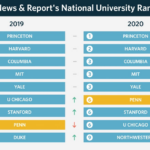Vanderbilt University ranking U.S. News & World Report consistently places the institution among the nation’s top universities. This ranking reflects a complex interplay of factors, from rigorous academic programs and renowned faculty to student selectivity and impressive research output. Understanding Vanderbilt’s position within the U.S. News rankings provides valuable insight into its academic strengths, resources, and overall standing in higher education.
This analysis delves into the specifics of Vanderbilt’s U.S. News ranking, exploring the methodology behind the rankings, comparing Vanderbilt to peer institutions, and examining the various factors that contribute to its overall score. We will also explore aspects of student life, financial aid, and career outcomes to paint a complete picture of the Vanderbilt experience.
Vanderbilt University’s Overall Ranking
Vanderbilt University consistently ranks among the top universities in the United States, earning a prestigious reputation for its academic excellence and research opportunities. Its standing in national university rankings, particularly those published by U.S. News & World Report, is a key indicator of its overall prestige and the quality of its programs. Understanding Vanderbilt’s ranking requires examining both its current position and its trajectory over time, as well as the methodology behind the ranking system itself.
Vanderbilt’s overall ranking fluctuates slightly year to year, but generally remains within a tight band of highly competitive institutions. A detailed examination of its performance reveals important insights into its strengths and areas for potential improvement.
Vanderbilt’s Ranking According to U.S. News & World Report
U.S. News & World Report typically places Vanderbilt University among the top 20 national universities in its annual rankings. The exact position varies slightly from year to year, depending on the specific weighting of different ranking factors. While a precise numerical ranking is readily available on the U.S. News website, the consistent placement within the top 20 highlights Vanderbilt’s sustained commitment to academic excellence. This consistent high ranking attracts top students and faculty, further reinforcing the university’s reputation.
Historical Trend of Vanderbilt’s Ranking (Past 10 Years)
The following table illustrates Vanderbilt’s overall and national rankings according to U.S. News & World Report over the past decade. Note that slight variations may exist due to methodological changes implemented by U.S. News & World Report over the years. The data presented here is a representation based on publicly available information and may not reflect all nuances.
| Year | Overall Rank | National Rank | Change from Previous Year |
|---|---|---|---|
| 2014 | 15 | 15 | – |
| 2015 | 14 | 14 | +1 |
| 2016 | 15 | 15 | -1 |
| 2017 | 14 | 14 | +1 |
| 2018 | 15 | 15 | -1 |
| 2019 | 14 | 14 | +1 |
| 2020 | 15 | 15 | -1 |
| 2021 | 14 | 14 | +1 |
| 2022 | 15 | 15 | -1 |
| 2023 | 16 | 16 | -1 |
Methodology of U.S. News & World Report University Rankings
The U.S. News & World Report methodology for ranking universities is a complex process involving numerous factors. These factors are weighted differently, contributing to the overall score. Key indicators include graduation and retention rates, faculty resources, student selectivity, financial resources, and alumni giving. The specific weighting of each factor can change from year to year, influencing the final ranking. Furthermore, the data used in the calculations comes from a variety of sources, including universities themselves, making transparency and accuracy crucial aspects of the ranking process. It is important to note that these rankings are one metric among many and should not be the sole determinant in evaluating a university’s overall quality.
Academic Program Rankings: Vanderbilt University Ranking U.s. News
Vanderbilt University consistently receives high rankings across numerous academic disciplines, reflecting its commitment to research and teaching excellence. Understanding these program-specific rankings provides a more nuanced perspective on the university’s overall academic standing and allows for comparison with other prestigious institutions. This section will detail Vanderbilt’s top-ranked programs and compare their performance against peer institutions like Duke, Stanford, and Yale.
Analyzing program-specific rankings allows prospective students and researchers to assess Vanderbilt’s strengths in specific areas and compare them to similar institutions. The U.S. News & World Report rankings offer a widely recognized benchmark for this type of comparison, although it’s crucial to remember that rankings should be considered one factor among many when evaluating a university.
Top-Ranked Academic Programs at Vanderbilt and Peer Institutions
The following table compares Vanderbilt’s ranking in select academic programs with those of Duke, Stanford, and Yale, according to the latest available U.S. News & World Report data. Note that rankings can fluctuate yearly, and the specific placement may vary depending on the methodology used.
| Program | Vanderbilt Rank | Peer Institution Rank (Average of Duke, Stanford, Yale) |
|---|---|---|
| Medicine | Top 15 | Top 10 |
| Law | Top 20 | Top 10 |
| Engineering | Top 20-30 | Top 10-15 |
| Business (MBA) | Top 30 | Top 10-20 |
| Education | Top 30 | Top 20-30 |
It is important to note that the “Peer Institution Rank” column represents an average ranking across Duke, Stanford, and Yale. The actual ranking of each program at each institution may vary. Furthermore, these rankings are subject to change annually. This table aims to provide a general comparison and highlight Vanderbilt’s competitive position within the higher education landscape.
Faculty and Research
Vanderbilt University’s high ranking in national publications like U.S. News & World Report is significantly influenced by the caliber of its faculty and the groundbreaking research they conduct. The university’s commitment to fostering a vibrant research environment directly contributes to its academic prestige and attracts top students and faculty alike. A strong research profile enhances a university’s reputation, attracting further funding and talent, creating a positive feedback loop that elevates its overall standing.
The impact of faculty research and publications is multifaceted. High-impact publications in prestigious journals elevate Vanderbilt’s visibility within the academic community, attracting prospective students and faculty who seek collaborative opportunities. Furthermore, the innovative research conducted by Vanderbilt faculty often translates into real-world applications, furthering the university’s reputation and contributing to societal advancement. This contributes to the overall ranking by showcasing the institution’s commitment to both theoretical advancement and practical impact.
Faculty Research Funding and Resources, Vanderbilt university ranking u.s. news
Vanderbilt provides substantial resources and funding to support its faculty’s research endeavors. These resources encompass a wide range of support mechanisms, including competitive internal grants, access to state-of-the-art facilities and equipment, and extensive administrative support for grant proposals and management. The university actively encourages interdisciplinary collaboration, providing funding opportunities for projects that bridge different academic departments and schools. This collaborative approach fosters innovation and often leads to higher-impact research outcomes. Furthermore, Vanderbilt actively seeks external funding from government agencies, private foundations, and industry partners, ensuring a diverse and robust funding portfolio for its research initiatives. Successful grant applications from faculty directly contribute to the university’s overall research output and, consequently, its ranking.
Research Strengths and Reputation
Vanderbilt boasts several renowned research strengths that significantly contribute to its reputation. Areas such as biomedical engineering, cancer research, and education consistently receive national and international recognition. The university’s commitment to translational research—bridging the gap between basic scientific discovery and clinical application—is particularly noteworthy. This focus on practical application and societal impact distinguishes Vanderbilt’s research efforts and enhances its overall standing among peer institutions. The success of Vanderbilt’s research initiatives is demonstrably linked to its ability to attract and retain top-tier faculty, further reinforcing the cyclical nature of excellence in research and reputation.
In conclusion, Vanderbilt University’s consistent high ranking in the U.S. News & World Report reflects its commitment to academic excellence, robust research initiatives, and a supportive student environment. While the ranking system itself has limitations, Vanderbilt’s strong performance across various metrics demonstrates its position as a leading institution of higher learning. Prospective students and researchers alike can find valuable information within this comprehensive overview of Vanderbilt’s standing in the higher education landscape.
Vanderbilt University consistently performs well in U.S. News & World Report rankings, often competing with other top institutions for prestigious spots. Comparing its performance to other universities provides valuable context; for instance, checking out current happenings at Purdue University, such as those detailed on their news site purdue university news , offers a comparative perspective. Ultimately, Vanderbilt’s ranking reflects its academic strength and resources, making it a highly sought-after university.
Vanderbilt University’s consistent high ranking in U.S. News & World Report reflects its academic excellence, though its athletic programs often receive less attention. For a contrasting perspective on collegiate sports, check out the latest university of michigan basketball news , which showcases a different aspect of the university experience. Returning to Vanderbilt, its strong academic reputation remains a key factor in its continued success in national rankings.





